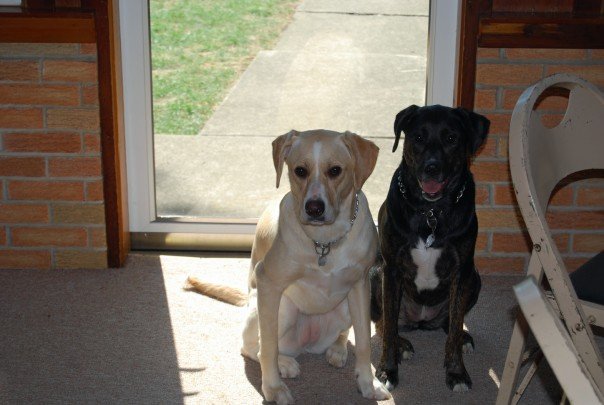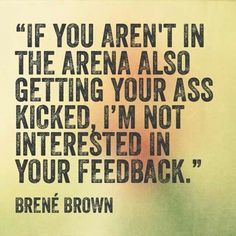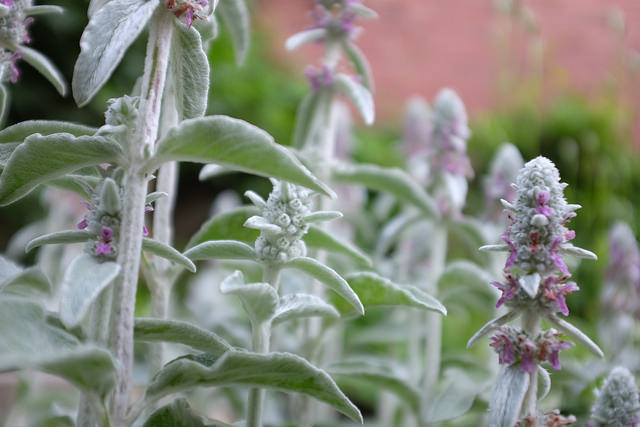When Kristy and I lived together, we decided to venture into the doggie world and found one at the local shelter. In her wisdom, Kristy had me agree to a puppy prenup before we brought Dinah Mae Crowder home, so I fully recognized that when Kristy moved out, the dog left with her. Within a month, I found the absence of the canine energy unbearable and began a search for a new dog. JJ agreed, but only if we adopted two.
We drove a few hours away to get our girls, litter mates, (or so they told us, because they bore no familial resemblance.) We loved the silky coat of the blond, and a certain boxy black pup caught my attention. We brought home Lizzie and Roxanne when they were about 8 weeks old and fell immediately in love.
We could propose ours were perfect dogs. Our girls never chewed on things. They didn’t get on the furniture. They loved children. Lizzie was a known favorite by babies; she would recline on her side and toddlers would crawl into the pocket of her 4 legs and lean back in comfort. Lizzie might lift her head, as if to check on which child was taking a turn, and then return to her lounging.
And I came to agree with JJ’s insistence on two dogs, even with the fortune we spent in dog food. When our children arrived, the pups had one another to roll their eyes at every time we brought home a new baby. They slept together every night, shared a dinner plate, and like two widows who needed to take their medication, they made sure the other remembered to go outside to pee.
We lost our Roxie a year and a half ago to the diabetes. (Lesson learned on the cheap dog food. We extended her life from a one-month prognosis to over 6 months just by switching to grain free.) The last 18 months without her beloved sister left Liz in a funk, mopey, despite the extra love and attention our kids would shower upon her. The kids had been indifferent to the dogs; they were fixtures, like the big brown chair that has always been a part of our living room. But once Roxanne was gone, the impermanence of our creatures sunk in and they began to give more value to the doggie in our living room.
This week we had to say goodbye to our sweet and affectionate Lizzie as well. It happened quick, after what we thought was just an incident of her finding and ingesting the thanksgiving turkey, but she got worse rather than better. We weren’t afforded the months in advance to emotionally prepare. One day she had bad gas, and then a few days later our home was significantly more empty, despite the 6 humans who occupy the small space.
Beyond my own grief, this process of walking with my children through loss and heartache gave me opportunity for reflection. One of them goes to bed and arises in tears. My oldest asked me, “mom, do you cry with tears?” I told him I cry in a thousand different ways. He told me he really only cries with tears or without them, but that he cried with tears for Lizzie. Even our littlest, who only understands time in terms of “yesterday” and “tomorrow” no matter how many days separate us from the past and the future, broke down at our little burial when he realized the dogless situation wasn’t changing. It’s here I notice my tendencies and natural desire to change the situation for them, even when the voices of wisdom tell me to respond otherwise.
The kids are already asking for a pup and part of me wants to say, why? so it can rip your heart out all over again!? If we don’t get a new dog, I won’t ever have to watch them feel like this. Their willingness to love after loss is far greater than my own. It’s amazing how my experience of the world has taught me to clamp down on my heart to protect it, to harden rather than to risk hurt. My kids still have a trust in the goodness of the world, even despite pain and disappointment.
But I’ll be honest: It’s taking every ounce of power in my being not to run out and find a puppy for under our tree this Christmas. Everyone is right, I do NOT want to potty train a pup in the winter (or at all, as JJ is so talented at it), which may be the only thread holding me back from liking every doodle-selling page on FB. I crave the dog energy in my home. I want to share space with another being when my kids have left me for the school day. But most of all, I want the pain of absence to fade to the background. I don’t want to feel loss anymore, so my natural inclination is to go get something; fill the gaping hole of my love for my dogs.
Their willingness to try again, coupled with my desire to fix it all, is a dangerous situation. I have a feeling this is the breeding ground for codependence, so again I must heed to the voices that remind me the hard thing is the good thing, and I must resist the puppy (and quick and simple solution) temptation.
The irony lies in my yoga class from Monday, when I taught a yin class and implied that we often get into places (poses) that bring about discomfort and our tendency is to wiggle and move – to try to find a way out. We don’t let the pose in, so it never does its work in us. Grief** is probably one of the most commonly avoided emotions in our culture, and we sidestep it by doing all the things I really want to do right now, like buying a new dog.
I awake to the absence. When I’m working around home, my sense of being alone is heightened. For years now, I’ve become annoyed with the growing mountain of dog hair I had to sweep. I griped about the cost of leaving the dogs while we traveled. But not long ago, a wise teacher asked, “do I see the hair or do I see the dog?” and it made me reflect before it was too late. What these girls added to my life was far greater than the time it took to run the vacuum or the costs of booking a doggie sitter. I wish it didn’t take absence to heighten the love. Maybe that’s should be intention of the next furry creature that will eventually pee on our carpet: to engage the process, not just grieve when it’s over.
**If you’ve not read anything by Caleb Wilde, you should. His blog was Confessions of a Funeral Director and his perspective on grief and grief support is astounding. He even made it onto the Robcast recently.


 I’ve read Brene Brown’s
I’ve read Brene Brown’s 